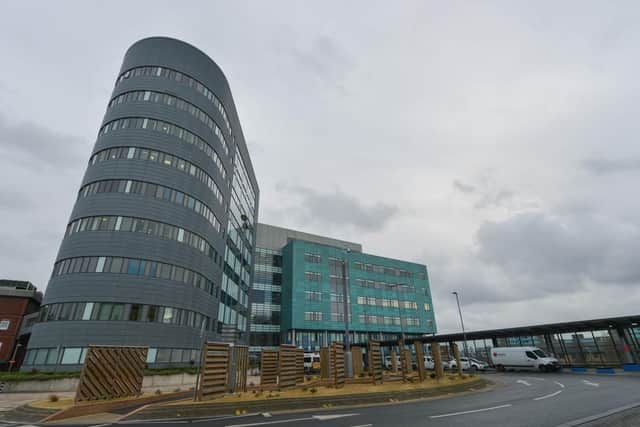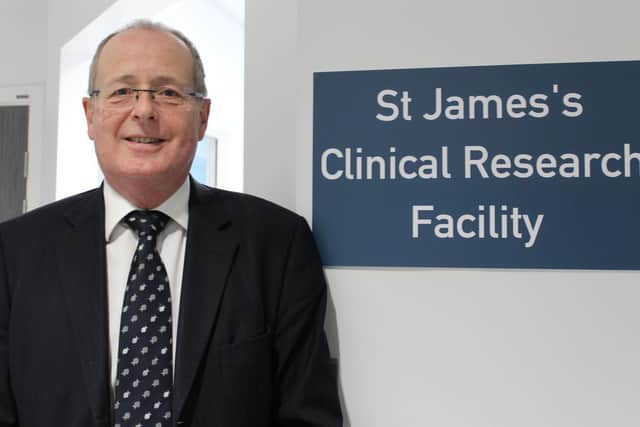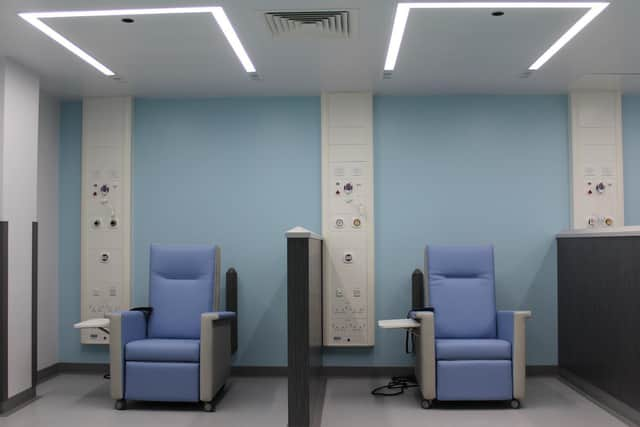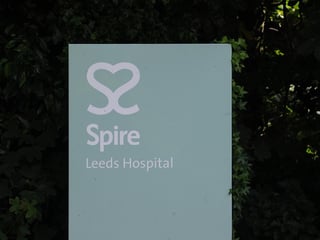Leeds hospital clinical trials and how they work as new £3.2m research facility opens
and live on Freeview channel 276
Leeds Teaching Hospitals NHS Trust opened its purpose-built Clinical Research Facility (CRF) at St James’s University Hospital today.
It provides dedicated space and facilities for the care of patients participating in clinical trials for new drugs, therapies, techniques or technologies.


Advertisement
Hide AdAdvertisement
Hide AdLeeds CRF director Professor Chris Twelves, a professor of clinical cancer pharmacology and oncology at the University of Leeds, said “This state of the art, purpose-built facility will transform the way patients take part in clinical trials. It will not only enhance the patient experience but allow us to undertake trials on a different level to before.”
Located within the Bexley Wing, the new CRF doubles the amount of space available for patients taking part in research, providing a more spacious, comfortable and better-equipped environment.
It will also allow overnight stays for research patients who need round the clock clinical monitoring, something which could not previously be accommodated.
The treatment suite of six beds, 11 treatment chairs and one procedure room has enough space for 18 patients who could all be participating in different trials at the same time.


Advertisement
Hide AdAdvertisement
Hide AdThere are also dedicated research consulting rooms, alongside supportive clinical care space to deliver high-quality outpatient, day case and inpatient treatment and care.
Also in health: The three-year-old Leeds girl locked in a body that doesn't work
Dr Jacqueline Andrews, the hospital trust's director of research and innovation, said: “The opening of the new CRF will bring tremendous benefits to our patients. It has been demonstrated that patients treated at research-active hospitals have better outcomes.
"We are committed to expanding our research facilities throughout the trust to ensure all our patients have the opportunity to get involved in research.”


Advertisement
Hide AdAdvertisement
Hide AdThe new CRF was funded by the hospital trust with support from the University of Leeds, while hospital charity Leeds Cares provided an additional £200,000 towards specialist equipment.
Leeds Cares managing director Andrew Cratchley said: “As the official charity partner of Leeds Teaching Hospitals, Leeds Cares supports NHS staff to deliver the best care for patients and their families.
“We’re incredibly grateful to our donors and supporters for helping us fund equipment for the new Clinical Research Facility.
“By funding such projects, we’re helping to ensure that patients and their families continue to benefit from the best possible care.”
Advertisement
Hide AdAdvertisement
Hide AdAlso in health: Family of four-year-old boy with Neuroblastoma fundraising for cancer treatment in America
What Clinical Research Facilities does the trust have?
Children’s CRF, Clarendon Wing, Leeds General Infirmary
Dental CRF, Leeds Teaching Hospitals Trust Dental Hospital
Leeds General Infirmary CRF, Jubilee Wing, Leeds General Infirmary
National Institute for Health Research and Leeds Biomedical Research Centre, Chapel Allerton Hospital
St James’s University Hospital CRF, Bexley Wing, St James's University Hospital
Why are clinical trials needed?
Advertisement
Hide AdAdvertisement
Hide AdClinical trials are research studies involving people. They help NHS staff understand how to treat a particular illness using new drugs, therapies, techniques or technologies.
Trials may benefit patients directly, or others like them, in the future. Patients who take part in a clinical trial may be one of the first people to benefit from a new treatment.
All clinical trials of new medicines go through a series of phases to test whether they are safe and whether they work. The medicines will usually be tested against another treatment called a control. This will either be a dummy treatment (a placebo) or a standard treatment already in use.
How do clinical trials typically work?
Phase 1 trials: A small number of people, who may be healthy volunteers, are given the medicine. The drug is being trialled in human volunteers for the first time. Researchers test for side effects and calculate what the right dose might be to use in treatment. Researchers start with small doses and only increase the dose if the volunteers do not experience any side effects, or if they only experience minor side effects.
Advertisement
Hide AdAdvertisement
Hide AdPhase 2 trials: The new medicine is tested on a larger group of people who are ill. This is to get a better idea of its effects in the short term.
Phase 3 trials: Carried out on medicines that have passed phases 1 and 2. The medicine is tested in larger groups of people who are ill, and compared against an existing treatment or a placebo to see if it's better in practice and if it has important side effects. Trials often last a year or more and involve several thousand patients.
Phase 4 trials: The safety, side effects and effectiveness of the medicine continue to be studied while it's being used in practice. Not required for every medicine. Only carried out on medicines that have passed all the previous stages and have been given marketing licences – a licence means the medicine is available on prescription.
How can you take part in clinical trials?
The Be Part of Research website has information about clinical trials and other research from several different UK registers.
You can also search the Be Part of Research site to find trials relevant to you, and you can contact researchers yourself.
